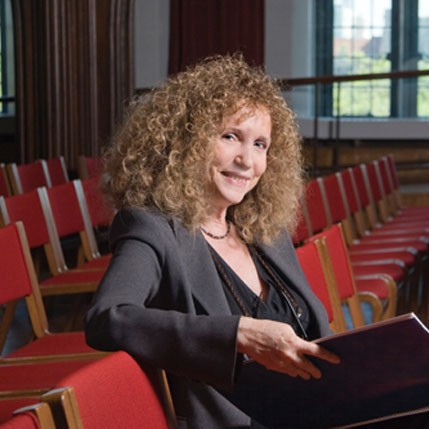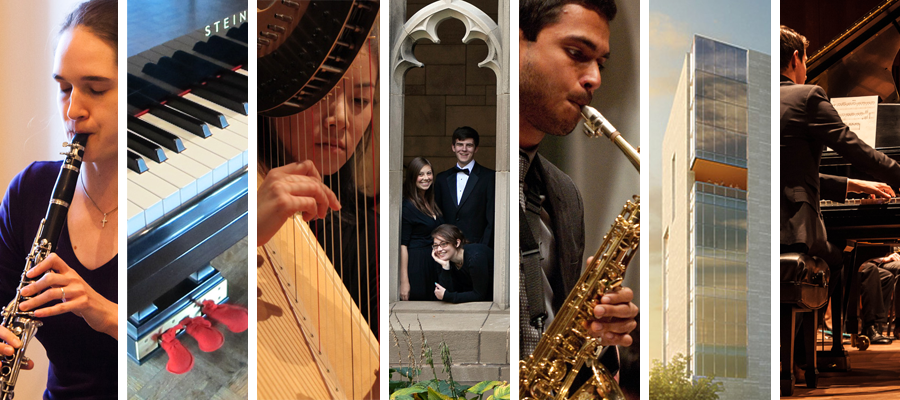 As part of our ongoing series of department interviews, Pulitzer Prize-winning composer and Andrew MacLeish Distinguished Service Professor of Music Shulamit Ran talks about her work and the upcoming Logan Center performance.
As part of our ongoing series of department interviews, Pulitzer Prize-winning composer and Andrew MacLeish Distinguished Service Professor of Music Shulamit Ran talks about her work and the upcoming Logan Center performance.
You composed a new work specifically for the Opening Weekend of the Reva and David Logan Center for the Arts. “Logan Promenades,” will be performed in the new Concert Hall. How did the venue, or possibly even the acoustics of the new hall, influence you in your composition? Is there any special significance in your use of two trumpets in this work? Please share a little bit of the background of this piece.
Not having heard, as of yet, any music at the new Concert hall I cannot say that it is the hall’s acoustics that has inspired it. But I will certainly admit that being at the Logan for the first time during the “soft opening” this past spring provided a real push. Such a beautiful space! I came home and started to hear music. Initially when Bill Michel, the Center’s director and its extraordinary driving spirit, spoke to me about possibly writing a piece for the upcoming occasion, I proposed that a previous piece I has created for the University, “Ad Sciendam…” composed for the 500th convocation in October 2009, be repeated. It already has been brought back, much to my delight, on a few occasions, by the University chorus conducted by James Kallembach. A composer loves nothing more than repeat performances, and I was ready and happy to have this piece, composed expressly for the University, represent me once again at this event. But that wonderful afternoon at the Logan last spring sparked some new thinking, and so we have “Logan Promenades”. As for the choice of two trumpets, to tell the truth, I did not realize that the piece, on this occasion, would be played in the new Performance Hall. And so I was imagining music that, I thought, could penetrate through the Logan space wherever the musicians would be situated, and wherever you would be standing or sitting, as a listener. Two trumpets, with the sound bouncing back and forth, seemed to have that kind of carrying power, and that ceremonial quality I was imagining. There is something wonderfully refreshing about composing for an occasion that is not “a concert”, or a “new music event”, but rather a very festive occasion that brings people together for many varied reasons all of which have to do with the celebratory nature of the situation. Writing a piece for such an occasion is its own unique challenge, and certainly a great joy and an honor. And so one thinks not only in the pure terms of music, but also the occasion, the space, and the audience congregating in anticipation of the event.
As a highly decorated composer including the Pulitzer Prize (1991), two fellowships from the Guggenheim Foundation, recipient of 5 honorary doctorates, and much more, what in your career are you most proud of? Is there a particular work that defines your voice, as a composer?
That is really difficult for me to say. I would like to hope that, in some way, I, too, keep reinventing myself as a composer. I like, and need, to surprise myself. I am proud of the fact that performers who commission me will often tell me that they are excited by the thought that they have no idea what the piece that I write for them will turn out to be, because there isn’t one predictable path that they can assume I would take. That they are willing to embark on an adventure with me is a thrilling thought, though, of course, the sense of responsibility can be daunting. I will tell you that through most of my life as composer, nearly every piece I had created was by commission. It gives me deep satisfaction to know that music-makers of all kinds – individual performers, ensembles, musical organizations – wish for me to create music especially for them. There’s a great sense of satisfaction, and of validation, in that knowledge. I have always believed that it is the performers, more than any other group, who are the real catalysts as to whether a composer’s music will live into the future. It is they, after all, whose passion and commitment, not to mention time, talent, energy, is what brings the music to life. They are the ones who give voice to that which the composer creates, revealing it to the listener.
I have just now returned from Denmark, where Ars Nova Copenhagen, one of Europe’s premiere vocal groups, performed my “Credo/Ani Ma’amin” under the direction of Paul Hillier [renowned choral director and multiple Grammy-Award winner]. The performance was deeply moving, and various audience members came afterwards to tell me how much the music meant to them. This kind of experience was possible only thanks to the deep immersion of the performers — who must sing as well as speak in this work — in making the music their own. That I am able to have this type of experience with my closest collaborators, i.e. the performers, is a real source of pride.
You ask me to cite one particular work, and that is very difficult for me to do. Each work defines my voice in some way. They all are “my children”. But perhaps if you asked me which of my works I would, if I could, want to see on stage tomorrow, I think I might say my opera, “Between Two Worlds (the Dybbuk)”.
Interview by Julia Tobiska, Performance Program Assistant
The Logan Launch Festival is a free three-day festival celebrating the opening of the Reva and David Logan Center for the Arts, a hub for the vibrant arts scene at the University of Chicago and a destination for the South Side and greater Chicago.